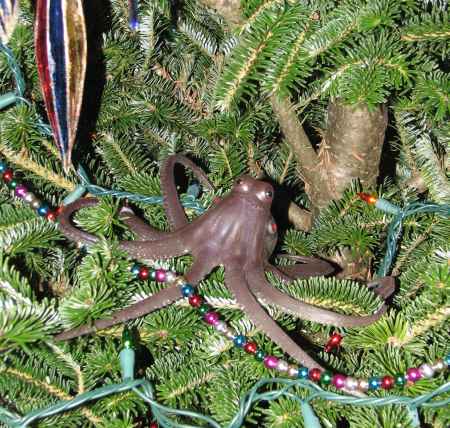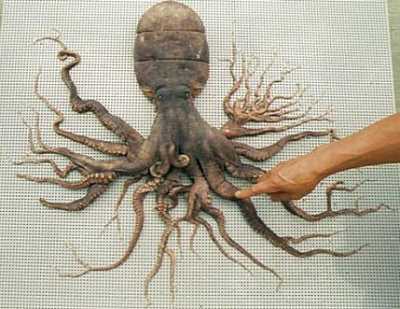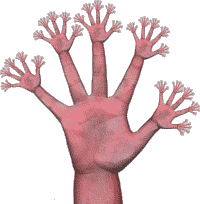While I often focus on the Pacific Northwest Tree Octopus (Octopus paxarbolis) due to its importance to the Cascadian ecosystem and the sheer tragedy of its plight, it is not the only octopus in the world with an affinity for trees. Some other species -- such as the phytosuccivorous New England Sugar Octopus; the Australian Tree-ringed Octopus; and the furry, blue Thujoctopus pilosa -- are mentioned on the tree octopus sightings page.
Susan Scott has just written in Hawaii's Star Bulletin about two other tree (or at least semiarboreal) octopuses that I was unaware of in her article "Tale of octopi climbing trees has long legs".
According to Words of the Lagoon by R.E. Johannes (in the chapter titled "The Arboreal Octopus"), on the islands of Palau, female octopuses have been seen to climb out of the water and into the mangrove trees to rear their young -- an inversion of the reproductive strategy of O. paxarbolis. However, there's some controversy surrounding this claim since the octopuses are reputed to give birth in the trees, not lay eggs like all other octopuses. Perhaps they carry a clutch of eggs to the trees hidden in their arms just prior to hatching?
In Halieutica, a poetic treatise on the nature of fishes and fishing practices of the ancients, the 2nd century poet Oppian of Corycus tells how octopuses ("preke") would come out of the water and climb up olive trees to get at the delicious fruit. These semiarboreal octopuses so dearly loved olives that fishermen would drag olive branches behind their boats to lure them out of hiding to catch them. (Could this be the source of the Wiltonism: "olives are deadly, so they say, depending on where you find them"?) Here's an 18th century translation of the relevant passage:
In Some the strange Caprice of Love inspires
Not Home-bred Joys, or Sea confin'd Desires:
The Quiver'd God to rolling Waves below
From verdant Shores directs the pointed Blow,
And Fishes Breasts with Earth-sprung Passions glow.
Rock-haunting Sargo's, and the crawling Preke
Extraneous Objects to their Pleasures seek.
With all the Transports of an eager Spouse
Th' enamour'd Preke galants Minerva's Boughs.
Surprising Singularity of Love!
That brutal Souls a leafy Fair should move,
And Fishes court the Daughter of the Grove.
Where near the shore a thriving Olive grows,
With swelling Berries and luxuriant Boughs,
The Preke ascends, as o'er the Mountain Dews
The Cretan Hound his flying Game persues,
With low-hung Nose explores the scented Ways,
Picks ev'ry Footstep, and unwinds the Maze,
Attacks the panting Wand'rer where he lies,
And loads his Master with the bloody Prize.
Thus He the scented Olives Charms obeys,
Springs from the Deep, and tries aerial Ways.
With eager Welcome first he clasps the Root,
And wreaths luxuriant in the kind Salute.
As when his long-expected Nurse he spies,
With open Arms the smiling Infant flies,
Hangs on her Knees with violent Embrace,
And lifts his grappling Fingers to her Face,
In softer Joys aspiring to be blest,
To grasp her Neck, and fondle on her Breast;
Thus round the Trunk at first the Wanton twines,
But soon his Passion to the Boughs resigns.
Born by Desire the leafy Height attains,
Knits round his Legs, and melts in am'rous Chains.
To ev'ry Branch transfers th' alternate Kiss,
Lost in the copious Latitude of Bliss.
The Trav'ller thus, whom safe from foreign Shores,
To native Fields th' auspicious Gale restores,
His thronging Friends in kind Embraces holds,
And hands successive in th' endearing Folds.
As round the stately Firr in humid Rings
Th' uxorious Stalk of creeping Ivy clings;
Stretcht from the Root th' aspiring Volumes flow,
Climb round the Trunk, and curl on ev'ry Bough;
Thus o'er Minerva's Tree the Sea-born roves,
And wreaths successive in the balmy Loves.
But when remiss exhausted Nature lies,
Back to the Sea the languid Crawler hies,
Satiate with Love, and Vegetable Joys.
His strange Amour experienc'd Fishers know,
And send the verdant Fraud to Seas below.
The Boughs that spread superior to the rest
Behind the Boat they drag with Lead deprest.
With no indiff'rent Look, or tardy Pace,
The Preke beholds, and courts the green Embrace;
Drawn to the Boat the Bands of Love retains,
Contemns his Freedom, and asserts his Chains.
Lockt in the riveted Enjoyment twines,
Nor ev'n in Death his lovely Tree resigns.
Could this explain the evolution of the Pacific Northwest Tree Octopus? Did it first crawl out of the Puget Sound seeking delicious land fruit -- perhaps salal berries or Indian plums -- and became so enamored with the "green Embrace" of the forests that it took up permanent residence? Certainly as plausible an explanation as any put forward thus far.
UPDATE 2009-03-06: I have found some more information about the Polynesian tree octopuses...
UPDATE 2009-03-25: A follow-up with more on Old World tree octopuses...





